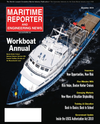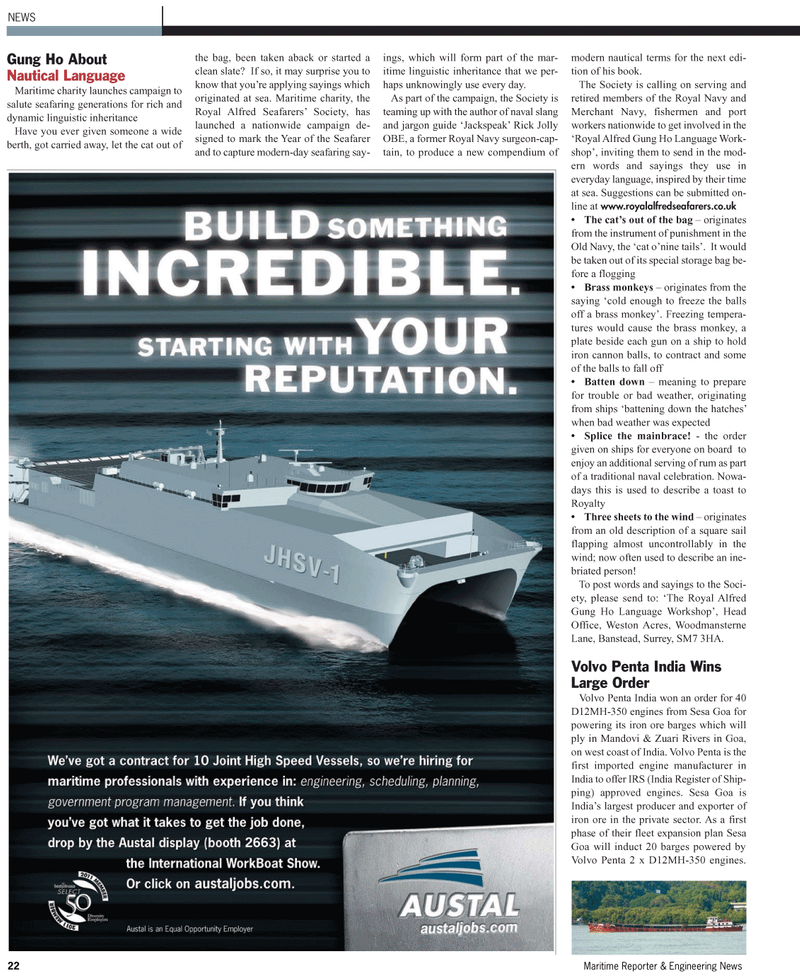
Page 22: of Maritime Reporter Magazine (November 2010)
Workboat Annual
Read this page in Pdf, Flash or Html5 edition of November 2010 Maritime Reporter Magazine
22 Maritime Reporter & Engineering News
Gung Ho About
Nautical Language
Maritime charity launches campaign to salute seafaring generations for rich and dynamic linguistic inheritance
Have you ever given someone a wide berth, got carried away, let the cat out of the bag, been taken aback or started a clean slate? If so, it may surprise you to know that you’re applying sayings which originated at sea. Maritime charity, the
Royal Alfred Seafarers’ Society, has launched a nationwide campaign de- signed to mark the Year of the Seafarer and to capture modern-day seafaring say- ings, which will form part of the mar- itime linguistic inheritance that we per- haps unknowingly use every day.
As part of the campaign, the Society is teaming up with the author of naval slang and jargon guide ‘Jackspeak’ Rick Jolly
OBE, a former Royal Navy surgeon-cap- tain, to produce a new compendium of modern nautical terms for the next edi- tion of his book.
The Society is calling on serving and retired members of the Royal Navy and
Merchant Navy, fishermen and port workers nationwide to get involved in the ‘Royal Alfred Gung Ho Language Work- shop’, inviting them to send in the mod- ern words and sayings they use in everyday language, inspired by their time at sea. Suggestions can be submitted on- line at www.royalalfredseafarers.co.uk • The cat’s out of the bag – originates from the instrument of punishment in the
Old Navy, the ‘cat o’nine tails’. It would be taken out of its special storage bag be- fore a flogging • Brass monkeys – originates from the saying ‘cold enough to freeze the balls off a brass monkey’. Freezing tempera- tures would cause the brass monkey, a plate beside each gun on a ship to hold iron cannon balls, to contract and some of the balls to fall off • Batten down – meaning to prepare for trouble or bad weather, originating from ships ‘battening down the hatches’ when bad weather was expected • Splice the mainbrace! - the order given on ships for everyone on board to enjoy an additional serving of rum as part of a traditional naval celebration. Nowa- days this is used to describe a toast to
Royalty • Three sheets to the wind – originates from an old description of a square sail flapping almost uncontrollably in the wind; now often used to describe an ine- briated person!
To post words and sayings to the Soci- ety, please send to: ‘The Royal Alfred
Gung Ho Language Workshop’, Head
Office, Weston Acres, Woodmansterne
Lane, Banstead, Surrey, SM7 3HA.
Volvo Penta India Wins
Large Order
Volvo Penta India won an order for 40
D12MH-350 engines from Sesa Goa for powering its iron ore barges which will ply in Mandovi & Zuari Rivers in Goa, on west coast of India. Volvo Penta is the first imported engine manufacturer in
India to offer IRS (India Register of Ship- ping) approved engines. Sesa Goa is
India’s largest producer and exporter of iron ore in the private sector. As a first phase of their fleet expansion plan Sesa
Goa will induct 20 barges powered by
Volvo Penta 2 x D12MH-350 engines.
NEWS

 21
21

 23
23
